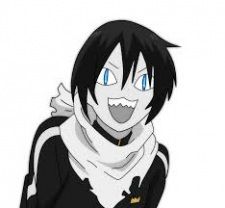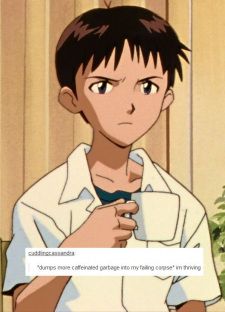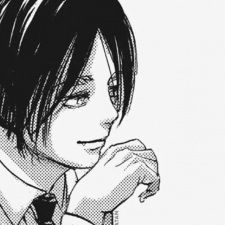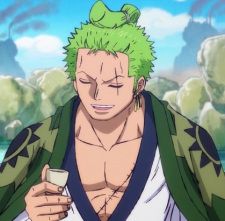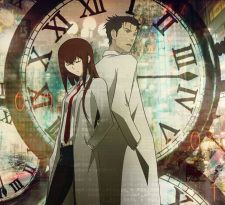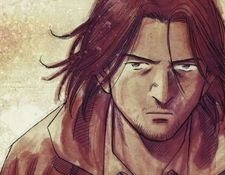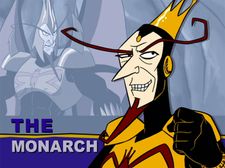[NO SPOILERS - ONLY VAGUE PASSIVE DESCRIPTIONS] SUMMARY The Final Chapters is a controversial ending that delves into the philosophical side of the narrative more than previous arcs do, which may be a deviation from what viewers expect from the show, and may annoy people who ideologically or politically disagree with the ideas which are portrayed. That being said there is still plenty to praise about the ending and its adaptation. It would be unfair to label this as a bad conclusion just because of the contentious feelings surrounding it. SUBTEXT The Final Chapters thoroughly explores aspects of the human condition, particularly in relation to morality and ethics. Some examplesof this that resonated with me were:
- Zeke & Armin, representing elements of nihilism vs optimism, or the idea that we have "no meaning in life" vs the idea that we have to "make our own meaning", and how said outlook should affect our desire to overcome violence, prejudice or turmoil.
- Mikasa & Ymir, representing the importance and power of love but also the importance of overcoming your emotions for the greater good.
- Eren's care for his friends being a metaphor for tribalistic tendencies, showcasing the somewhat illogical degree to which we value those closest to us while oftentimes failing to empathise with strangers.
- Eren himself realising that despite all of his power, he is "just another idiot" who can't solve every problem in the world, much like many powerful people in our world today. Eren is also a portrayal of how negativity and prejudice within the world only births more negativity and prejudice.
- Certain groups conveying the perseverance of human life and our desire to survive and protect the vulnerable in spite of all of the pain and suffering we both create and endure.
- The 'Alliance' being a microcosm of different ideologies within a society, showcasing how the overall opinions within a group are interwoven between each individual and illustrating how a society can evolve if people choose to put aside their differences and work together to achieve a common goal.
- The final credit sequence (among other subplots) critiquing our human inability to avoid conflict, cyclically repeating the perpetuation of hatred, revenge, war and fearmongering, although there is a suggestion that we are improving or at least have the capacity to improve one step at a time, which is an optimistic viewpoint that I would probably agree with.
Even if these ideologies that Isayama conveys are not new or original, it's great to see them portrayed intuitively in a mainstream show.
NARRATIVE
The plot itself is coherent and consistent albeit overly complex, making it difficult to grasp the most important pieces of the story in just one viewing (and this is without accounting for all of the smaller, more subtle pieces of information which contribute to things like worldbuilding). This might result in some people being left confused by the ending, especially people who like to dive in to the finer details of plots and characters in order to fully understand everything.
Additionally, there is a particularly high density of unexplained plot points within the final chapters in comparison to the rest of the anime, which may be intentional in order to allow viewers to come up with their own interpretations, but as a by-product there are instances in which certain powers, abilities and occurrences can be perceived as underdeveloped or in need of deeper explanation. Because of this, viewers are left to speculate and/or assume certain things, especially in relation to the mechanics of the paths/titan powers, as well as facets of Eren's character such as his true motivations.
There's an argument to be made that the pacing of the entire final arc would have also benefitted from being slower and more methodical in its exposition (in both the anime & the manga), both to allow time for the finer plot details to be elaborated upon, as well as to allow for more comprehensive transitions between the more emotional story beats.
As a result of what's mentioned above, the ending arc could be perceived as disjointed, nonsensical or underwhelming for many viewers. For this reason, the arc could have benefitted from taking the time to explain some of the smaller details and plot points simply for the sake of digestibility.
However, having said that, at the end of the day these critiques are not directly relevant to the overall conclusion nor the themes it explores. Every major and minor plot point does have a plausible explanation if viewers choose to invest the time into theorizing about them, so I don't consider this to be detrimental to the story itself, more so just a detriment to the viewing experience.
CHARACTERS
Some may argue that certain characters have their identity or meaning diluted or even stripped away in the final chapters, but I would argue that Isayama instead purposefully prioritises the philosophical messages of his story over giving characters a safer or more stereotypical finale, which I personally think is both more original and also more thematically fitting for AoT. Most characters are quite temporary, whereas thought provoking philosophy is something that's more likely going to leave an impact on a viewer/reader's life.
Even saying that, I would still stand by the opinion that every character has a narratively satisfying conclusion (particularly in relation the philosophies they represent), although some people certainly disagree.
Eren's character in particular stands out with his development over the entire course of the story, which culminates in the Final Chapters. Personally I consider him to be one of the most interesting and thought provoking characters in the entire anime medium as a result of the many layers that he has, particularly with how his different values/motivations collide and coincide with his limitations as the Founding/Attack Titan, which results in a deep and multi-layered characterization.
The fact that we don't see a lot of the story told from his perspective makes him both intriguing and, at times, a bit confusing.
Most other characters have their arcs wrapped up satisfyingly too - some happily, some bittersweet. Almost everyone gets a good send-off, which is worthy of praise considering the number of developed characters in the story.
There are a few characters who had their arcs slightly neglected in my opinion, who could have benefitted from having a few scenes dedicated to them in order to more cleanly explore their perspective on things. The fact that they didn't seems like a bit of a missed opportunity. But I would only say this applies to 2 or 3 characters, and all of these characters are still given an acceptable ending either way.
ADAPTATION
MAPPA's adaptation of these final chapters is faithful and enhances the manga well.
- Dialogue is changed slightly from the manga, making the more important scenes flow more smoothly, and allowing viewers to contemplate what is being conveyed with less ambiguity. But as I previously mentioned, the plot itself is quite complex; although all of the key bits of information are there, viewers may not pick up on everything on their first watch and may be left confused.
- Voice acting within the final chapters is excellent, enhancing the more emotional scenes very well.
- The animation is very good considering just how action-heavy some segments of these final chapters are. MAPPA have definitely stepped up their CGI game considerably in comparison to the first part of Season 4, and there are some awesome sakuga sequences that we all enjoy watching. I was extremely excited to see Arifumi Imai make a return as his animation sequences in AoT are iconic.
- The OSTs usage in the final chapters is great. Almost all of the series' most iconic tracks (of which there are many) make a return in various scenes, which hits particularly hard in the nostalgia department for long-time viewers. Linked Horizon also make their return, which is nice to see considering that they are responsible for some very memorable openings with their work in AoT.
CONCLUSION
This is the anime that got a lot of people in to anime (including myself). Regardless of how you feel about the story, it's hard to ignore the significance of the ending itself.
For me, the biggest flaw of the ending is how it glosses over details which could have been given more explanation, resulting in an conclusion that might be perceived as illogical or confusing. This occurs with powers and abilities, but also with certain characters' motivations and perspectives.
Although there are plausible explanations to almost all of these things if you take the time to theorize about them, it is just unnecessarily ambiguous. Many of these issues could have been resolved with just a few more lines of explanatory dialogue sprinkled throughout the final arcs.
I like everything else about the ending. I think it imparts a powerful message and provides an interesting and emotional conclusion to an incredibly influential and momentous story.
Of course, there is a substantial part of the fandom who strongly disagree with many aspects of the ending.
Everybody has the right to an opinion, but to me it seems that at least a sizeable portion of people blindly hate on AoT's ending without actually forming their own original stance on it. Reasons I see people cite as justification for their disliking of the ending are often (but not always) just regurgitated feelings lacking nuanced criticism (or in some cases even factual accuracy) echoed between emotional groups who usually speak in a bitter, immature and/or demeaning tone. To me this implies that a lot of the hate which the ending gets is not in good faith. In particular, r/titanfolk has acted as a catalyst for this type of behaviour ever since the ending was published.
On the other hand, many people blindly glaze the ending just because it's AoT, refusing to acknowledge potential flaws. This is an issue that pervades every fandom (as people find it difficult to criticize things which they care about), however AoT's fandom seems to suffer particularly badly from it. It's important to recognise that you can still love something even if it is flawed - what's important is what it means to YOU, not what it means to everybody collectively.
It is perfectly fine to like or dislike the ending for whatever reasons you see fit - different people have different expectations from creative media, and different opinions on the direction in which they would like said media and characters to go in. But all the same, it is not okay to speak to people who have a different opinion in such a way that implies they are stupid or wrong simply because of divergences in expectation.
This type of inflammatory behaviour stems from a lack of maturity and/or lack of empathy. It's a shame to see that many anime fans seem to have forgone the concept of respect.
I would encourage people to watch the ending with an open mind and form their own thoughts on it, rather than having their opinions warped by the sentimental hivemind of the internet.
------------------------------------------------------------------------------------------------
I tried to convey my thoughts on the ending as objectively as possible here, although I do have a lot of bias and personal attachment towards this show so please keep that in mind.
Critically, I would give The Final Chapters 8/10
Personally, I'd give them 10/10







